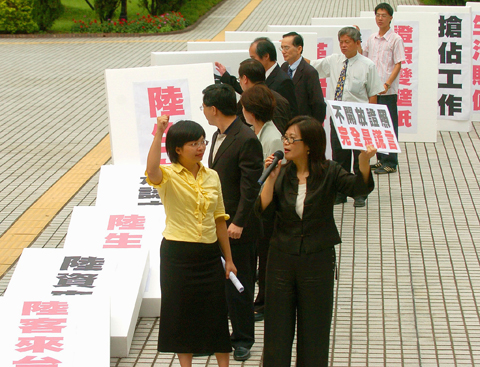Minister of Education Cheng Jei-cheng (鄭瑞城) said at the legislature yesterday that the schedule for the government’s proposal to recognize Chinese educational credentials was still under discussion after many legislators questioned him about the issue.
As for the issue of allowing Chinese students to enroll in Taiwanese universities, Cheng said there would be a cap on the number of Chinese students allowed to enroll in domestic universities and that individual universities would also have a cap.
He said those universities interested in recruiting Chinese students should establish a committee to handle the matter while the ministry would establish the necessary regulations.

PHOTO: WANG MIN-WEI, TAIPEI TIMES
TIMING
Democratic Progressive Party Legislator Chen Ting-fei (陳亭妃) said that Cheng had mentioned that it would take about two to three years before Chinese diplomas could be recognized by the government.
Chen said he wondered why President Ma Ying-jeou (馬英九) said the proposal would be carried out next year.
In response, Cheng said that the ministry was still deliberating over the time schedule for the proposal but that it might be completed earlier than expected.
However, he said that the bonus point scheme would not apply to Chinese students who wished to come to Taiwan to study and that the ministry would not offer scholarships to them.
Meanwhile, Cheng said that if everything went as planned, it was expected that national and private universities would be allowed to open extension education programs in China in the next academic year to recruit Chinese students as well as the children of Taiwanese businesspeople based in China.
VERIFICATION
In response to questions by Chinese Nationalist Party (KMT) Legislator Diane Lee (李慶安) about how to verify Chinese educational credentials proposed, Cheng said that given the fact that there are numerous high schools in China, it would be hard for the government to verify them all.
Thus a student’s academic performance, including national exams, would be used as the main criteria, Cheng said.
KMT Legislator Hung Hsiu-chu (洪秀柱) said that some had suggested that Taiwanese businesspeople offer scholarships to encourage Chinese students to study in Taiwan as part of their core staffer recruitment program.
Hung said that the government should consider this proposal because Chinese students would become accustomed to Taiwanese ways of thinking and better understand Taiwanese culture after studying here.

A magnitude 4.9 earthquake struck off Tainan at 11:47am today, the Central Weather Administration (CWA) said. The hypocenter was 32.3km northeast of Tainan City Hall at a depth of 7.3km, CWA data showed. The intensity of the quake, which gauges the actual effect of a seismic event, measured 4 in Tainan and Chiayi County on Taiwan's seven-tier intensity scale, the data showed. The quake had an intensity of 3 in Chiayi City and County, and Yunlin County, while it was measured as 2 in Kaohsiung, Nantou County, Changhua County, Taitung County and offshore Penghu County, the data showed. There were no immediate reports of

‘DENIAL DEFENSE’: The US would increase its military presence with uncrewed ships, and submarines, while boosting defense in the Indo-Pacific, a Pete Hegseth memo said The US is reorienting its military strategy to focus primarily on deterring a potential Chinese invasion of Taiwan, a memo signed by US Secretary of Defense Pete Hegseth showed. The memo also called on Taiwan to increase its defense spending. The document, known as the “Interim National Defense Strategic Guidance,” was distributed this month and detailed the national defense plans of US President Donald Trump’s administration, an article in the Washington Post said on Saturday. It outlines how the US can prepare for a potential war with China and defend itself from threats in the “near abroad,” including Greenland and the Panama

The Chinese Nationalist Party (KMT) is maintaining close ties with Beijing, the Democratic Progressive Party (DPP) said yesterday, hours after a new round of Chinese military drills in the Taiwan Strait began. Political parties in a democracy have a responsibility to be loyal to the nation and defend its sovereignty, DPP spokesman Justin Wu (吳崢) told a news conference in Taipei. His comments came hours after Beijing announced via Chinese state media that the Chinese People’s Liberation Army’s Eastern Theater Command was holding large-scale drills simulating a multi-pronged attack on Taiwan. Contrary to the KMT’s claims that it is staunchly anti-communist, KMT Deputy

RESPONSE: The government would investigate incidents of Taiwanese entertainers in China promoting CCP propaganda online in contravention of the law, the source said Taiwanese entertainers living in China who are found to have contravened cross-strait regulations or collaborated with the Chinese Communist Party (CCP) could be subject to fines, a source said on Sunday. Several Taiwanese entertainers have posted on the social media platform Sina Weibo saying that Taiwan “must be returned” to China, and sharing news articles from Chinese state media. In response, the Mainland Affairs Council (MAC) has asked the Ministry of Culture to investigate whether the entertainers had contravened any laws, and asked for them to be questioned upon their return to Taiwan, an official familiar with the matter said. To curb repeated